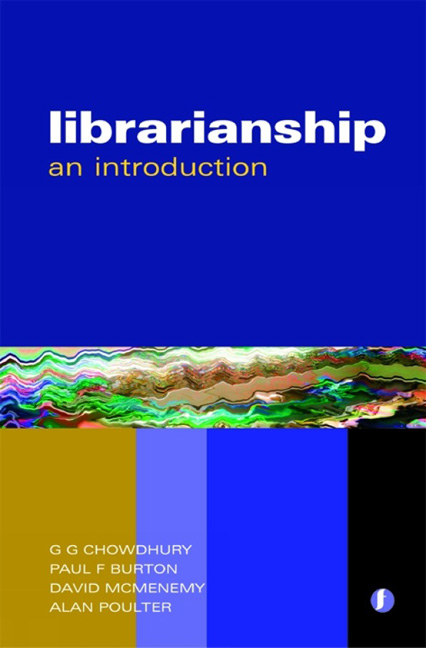Book contents
- Frontmatter
- Contents
- Preface
- Acknowledgements
- 1 Introduction
- Part 1 Libraries and information services: evolution or revolution?
- Part 2 Library and information resources and services
- Part 3 Information organization and access
- Part 4 Library and information users and society
- Part 5 Library technologies
- Part 6 Management and marketing in libraries
- Part 7 Education and research in librarianship
- Epilogue
- Glossary
- Resource list
- Index
Part 7 - Education and research in librarianship
Published online by Cambridge University Press: 08 June 2018
- Frontmatter
- Contents
- Preface
- Acknowledgements
- 1 Introduction
- Part 1 Libraries and information services: evolution or revolution?
- Part 2 Library and information resources and services
- Part 3 Information organization and access
- Part 4 Library and information users and society
- Part 5 Library technologies
- Part 6 Management and marketing in libraries
- Part 7 Education and research in librarianship
- Epilogue
- Glossary
- Resource list
- Index
Summary
Education in modern librarianship began in the USA over 125 years ago. Initially it was more like a professional training programme focusing on practical aspects of the job. The first set of postgraduate programmes was introduced in US universities in the 1920s. Library education in the UK also began just after the First World War, but was limited to only one university until 1946, when the Scottish School of Librarianship was formed in Glasgow. A number of other library schools followed in the 1960s. Several librarianship programmes were introduced in the Indian subcontinent during the first half of the 20th century.
Today librarianship as an academic course of study is offered mostly at postgraduate level throughout the world, though the nomenclature of the courses as well as the contents vary significantly. Courses are offered in different modes – through classroom education offering face-to-face teaching, as well as online and distance learning courses, all either full-time or part-time. Several institutions and professional associations offer specific course modules through continuing professional development (CPD) programmes and summer schools. Professional associations such as the ALA and CILIP play a great role in the accreditation of librarianship courses.
Although librarianship began as a professional course, providing practical training in different aspects of the job, over the years it grew as a major academic discipline with emphasis on research in both the theoretical and practical aspects of librarianship. Research degrees are offered by most of the university departments that provide postgraduate education in librarianship, though several major libraries – notably national libraries – and specially set up research centres (e.g. the Centre for Digital Library Research at the University of Strathclyde) are also engaged in research and development activities.
This part of the book provides an overview of the academic and research programmes in librarianship throughout the world through the following two chapters:
Chapter 25: Education in librarianship
Chapter 26: Research in librarianship.
The main objective of this part is to provide an understanding of how education in librarianship is currently offered and a brief introduction to the different kinds of research practices and methods in librarianship.
- Type
- Chapter
- Information
- LibrarianshipAn introduction, pp. 273 - 276Publisher: FacetPrint publication year: 2007



